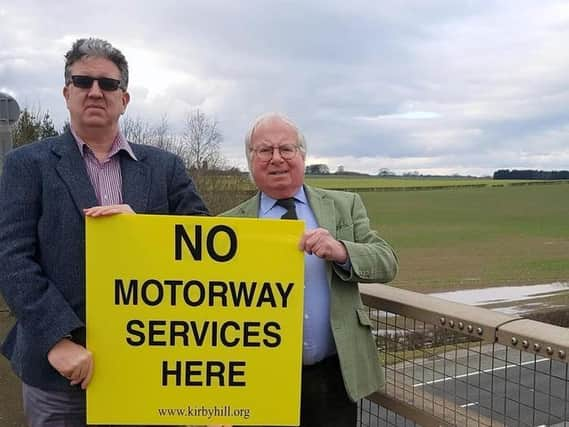Campaign group outraged as planning inspector approves Kirby Hill motorway service station near Boroughbridge after 14-day public inquiry


Kirby Hill Residents Against Motorway Services (RAMS) have released a statement in response to a government planning inspector's decision to give developers permission to build the services on the A1 near Boroughbridge following a 14-day public inquiry held last month.
The developers took their application to appeal after it was rejected by Harrogate Council in 2019. There have also been inquiries in 1997, 2003 and 2010 which ruled against the service station.
Advertisement
Hide AdAdvertisement
Hide AdThe campaigners now say that the planning system is 'unjust' after the green light was given for a development they claim will have an adverse impact on the natural environment of the Vale of York.
Applegreen and Welcome Break have promoted the scheme, which was finally approved by David Rose from HM Planning Inspectorate.
Kirby Hill RAMS chair Gareth Owens said: ‘This is a sad day for North Yorkshire and for the planning system. The decision by David Rose marks a U-turn by central government, after 25 years of refusal of MSA proposals at this site. It imposes on the local community an unwanted, inappropriate major development which will cause substantial harm. The character of the rural landscape, part of the Vale of York, will change forever.
"There will be harm to the setting of the historic, rural North Yorkshire village of Kirby Hill just 500 yards from the development and to two listed buildings: the Grade-II listed Skelton Windmill, built in 1822 and the Grade-I listed Church of All Saints, built in 986AD. Mr Rose has decided that the harm to the landscape and to our community is a price worth paying in order to provide facilities for the convenience of motorists using the A1(M).
Advertisement
Hide AdAdvertisement
Hide Ad"The local community, the seven local councils that I represent and all our elected representatives on Harrogate Council’s planning committee disagree with him. The government’s commitment to localism in planning is supposed to mean that local people, who know best, can shape development in the places where they live and work. The planning system has failed us in this respect. A great injustice has been done today."
The site in question is shown as open countryside in Harrogate Council's Local Plan, which was adopted in 2020 following six years of consultation, and was not earmarked as development land. The Local Plan did not include any references to a new motorway service station within the district - and is supposed to be policy framework until 2035.
Mr Owens added: "We were assured by the council’s planning officers that the open countryside north of Kirby Hill had been protected. This decision demonstrates that the Local Plan isn’t worth the paper it is written on. We feel we have been wasting our time contributing to it for the last six years, because the developers and planners can ignore the Local Plan and do whatever they like.
"Over the last 25 years, we have witnessed how public opinion and local views have come to be regarded as a nuisance and an obstacle in a planning system that favours developers. It’s
Advertisement
Hide AdAdvertisement
Hide Adtime the system was reformed and some balance re-introduced."
The planning permission granted to Applegreen by Mr Rose is in outline only and includes a long list of conditions which Kirby Hill RAMS has vowed to scrutinise at every stage.
Applegreen's lawyer Rhodri Price Lewis QC argued that government policy now requires services to be located no more than 28 miles apart, and that the distance between existing sites at Wetherby and Leeming Bar exceeded this.
A Planning Inspectorate spokesperson said:
“When reaching a decision Inspectors give careful consideration to views of the community and the evidence submitted at the time of appeal. The Inspector will also take account of planning legislation, guidance and policy. The reasons for the decision are set out in the decision letter.”
“There now follows a period of six weeks during which the decision can be challenged in the High Court.”
Comment Guidelines
National World encourages reader discussion on our stories. User feedback, insights and back-and-forth exchanges add a rich layer of context to reporting. Please review our Community Guidelines before commenting.